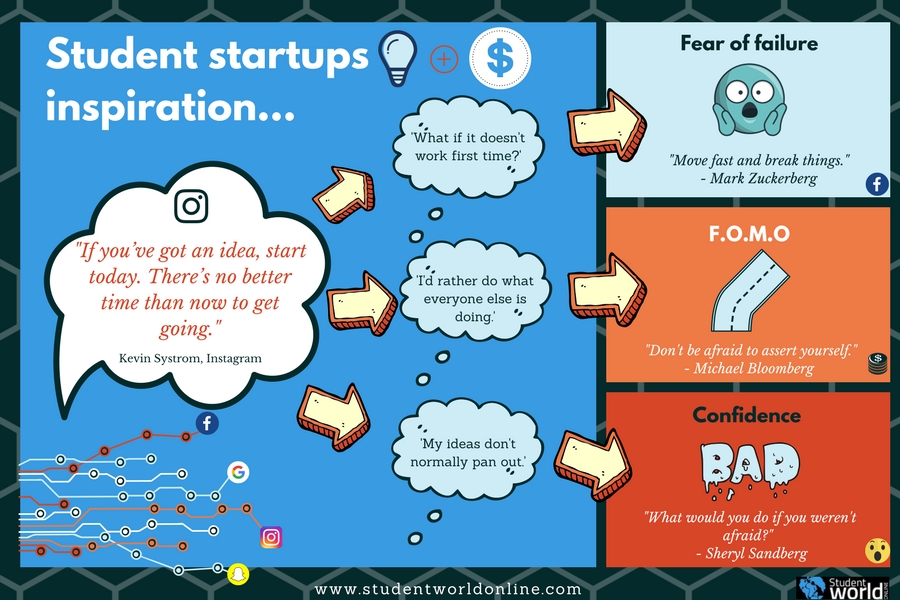YOU might be under the impression that entrepreneurs who made their starts towards business success are a relatively recent phenomenon, but this simply isn't true. There's a long and storied tradition of the world's greatest entrepreneurs putting their ideas together at university before pushing on to build huge and world-changing companies.
It's possible to go all the way back to the 1980s when Michael Dell started working towards major success while he was a pre-med student at the University of Texas, Austin. Dell finally took his company public in 1988, became the youngest ever Fortune 500 CEO in 1992 and he's now worth around $25 billion having made a huge impact through the technological innovation he helped to drive.
But of course the best-known examples today are Facebook founder Mark Zuckerberg who founded his world-beating media company in his dorm room at Harvard in 2004, as well as tech entrepreneurs such as Reddit founders Steve Huffman and Alexis Ohanian who founded Reddit in 2005 after they had graduated but who spent lots of time working on tech projects during their studies.
So what can these mega-successful entrepreneurs teach international students about starting to build a business while at university?
One of the greatest fears we all find tough to combat is the dread that what we're attempting to do is doomed to failure - if it's a new idea, then this aspect of your mindset could become a deciding factor in whether you are able to progress at all towards success.
"Move fast and break things." - Mark Zuckerberg, founder of Facebook
But entrepreneurs seem to take a different perspective to many of us, and perhaps this is the key to making sure your fear of failure doesn't take over: it seems they see failure as part of the process towards success as if they are experimenting. Mark Zuckerberg, for example, has famously said that one of his own personal philosophies is to 'Move fast and break things'.

Enterprising Oxford, which helps entrepreneurs to realise their business ideas in the UK, take a similar tack and encourage entrepreneurs to embrace failure as part of the journey, along with successes. They emphasize that budding entrepreneurs should also try to observe others' mistakes, in order to learn from them and avoid them on their own journey.
It seems that by knowing we're avoiding the mistakes of others, we're also reinforcing our own self-confidence on our own journey towards realising a business idea.
"What doesn’t kill you makes you stronger. . . learn about others’ mistakes, then learn from them." - Enterprising Oxford
One way in which how we think about others can affect our fear of failure is the value we place in others' opinions about how we are doing, and whether we're going to be successful. Again, if you're trying to build a new business model or put together a business based on a new idea, a lot of the responses you get from other people might well be confusion masquerading as confidence in predicting that you're overreaching towards success and that your idea isn't quite as good as you think it is.
"Really, in the end, who the hell cares what they think?" - Larry Kim, Founder and CTO, Wordstream
But if you have a fresh idea, the person making negative predictions is certain to have less idea than you do about whether it could succeed. Perhaps no one has tried it before, or no one has been noticed trying it before. So why listen to negative predictions?
Perhaps you're making major headway and you're on a journey no one has even thought of yet, so how could anyone possibly know, let alone know better than you, what the likelihood of success is?

Wondering whether to take your own path is tough, too. Say you've got a great group of friends at university, and you love hanging out with them but have what you think is an amazing idea. It keeps nagging you and you want to try it, but see your peers doing well at other things and you can't quite stop comparing your own work to theirs.
Social media is great for a lot of things, but perhaps this is where it could become a hindrance - if you're always seeing the curated view of others' lives and how much fun they're having you might start to think you're missing out: the dreaded 'F.O.M.O', or Fear of Missing Out. But as journalist Eric Barker said, F.O.M.O is pretty much good for anyone who might be trying to sell you something and can have a manipulative effect on your emotions.
"Good for Facebook. Good for Haagen Dazs sales. Bad for happiness." - Eric Barker, Time Magazine
Articles you'll like:
So it's important you don't give in to thinking that you should be doing what others are doing because according to their own words and pictures they are doing so well at it.
As the old saying goes, appearances can be deceiving, and when others are talking about their own lives it's likely they'll talk themselves up because sometimes they simply don't want to talk about struggles they have in their lives - perhaps they don't want to burden you.
There's no need to cut yourself off, of course, but you just need to get a bit smarter about what you see and hear. If you take everything with a pinch of salt, you might well end up perceiving things a little more realistically when you think about the lives of others.
It goes without saying that before the success of Apple, Facebook and Instagram and other huge tech enterprises, teenagers and students grew up dreaming of being on MTV.
But the amount of attention given to tech entrepreneurs such as Sergey Brin and Larry Page is now massive as they drive forward changing the world and revolutionize the way we all interact and access information.
Were these world-changers afraid to be different from their peers? Absolutely not.

One of the perennial problems facing entrepreneurs is that they are always in the position of building something new - so this means you're always going to be catching people by surprise.
You're always going to be in the position where you have to explain everything from square one, and therefore it's hard to find mentors who have followed the same path because that's the whole power of what you're doing right now as you break new ground.
"When I was first starting out, I pitched more than 100 VC firms in Boston. I was shot down. The rejection letters were brutal - but I learned several important lessons from them. Listen to the feedback you get from investors! Make the changes to improve your idea. Doing so will help you win the funding you need - and overcome your fears." - Larry Kim, Founder and CTO of Wordstream
Perhaps the only known way to find out if you're idea is any good is to get in front of the closest people you can find to experts in the field you're trying to launch your product for. Then you might start to get some insight into how your new business could work in reality, from people who perhaps know more than you do about the wider field you want to build your business for.
But remember that there's a difference between someone offering constructive feedback and someone simply dismissing your idea out of hand: the first type of feedback could be critical to your success, as Wordstream founder Larry Kim says: "Listen to the feedback you get from investors! Make changes to improve your idea."